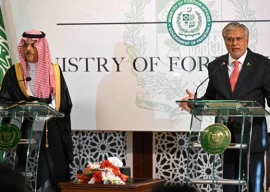
Pakistan’s relations with the United States have never transcended the transactional essence of this equation. There may have been a common cause, but that remains event and time-bound. The US-Pakistan relationship, or more specifically American interests in Pakistan, are predicated on two negatives — the dominating sense of relative instability in Pakistan and the fear of the nuclear weapons falling in wrong hands. The relationship is not based on any positive dividend. A fear-based relationship is, at best, speculative, wary, and lacks the assurance of fruitful dividend to Pakistan. The IMF-World Bank-ADB facilitation is useful to a degree but immerses Pakistan deep into the debt trap and, as an implication, makes it even more dependent on American goodwill.
Pakistan’s benefits are as transient and short-term as America’s interests. The cost that Pakistan has had to pay for this transitory relationship has been immense and has eroded the foundational security of both the state and society. The answer lies not in brewing hostility with a superpower, but in evaluating the risk-benefit equation and seeking self-dependence as a way out of the muddle. Christine Fair is right when she taunts us saying that our sovereignty is a measure of our ability to pay our own bills. On that count, a societal and institutional reinvention is needed in Pakistan.
Raymond Davis may have done Pakistan a huge favour, lamentably at the cost of precious Pakistani blood, in redefining the limits of American power to influence events in Pakistan and in jolting Pakistanis from the slumber of false comfort in America’s deadly embrace. While the government, and that may have been true for any government, still seeks traditional remedies to a toxic situation, it may just be forced to reinvent itself more to meet the needs of a deeply-troubled Pakistani state and society.
Raymond Davis is a symptom of a long-brewing malady. We need to change the way we do business within and without. That remains the clarion call. We need to disengage from the US at the operational and tactical level and chart our own course; deal with our challenges in our own way.
Rehman Malik may be well advised to review the latest US State Department instructions to its law enforcement agencies in dealing with diplomats and consular staff: “Diplomatic immunity is not intended to serve as a license for persons to flout the law and purposely avoid liability for their actions. Consular officers … have only functional immunity in respect of both criminal and civil matters and their personal inviolability is quite limited. No consulate is authorised to determine whether a given set of circumstances constitutes an official act. This is an issue that may only be resolved by the court with jurisdiction over the alleged crime.”
Case shut and closed. Let the courts, proceed.
Published in The Express Tribune, February 26th, 2011.






















1713272658-0/Copenhagen-fire-(1)1713272658-0-270x192.webp)






















COMMENTS (12)
Comments are moderated and generally will be posted if they are on-topic and not abusive.
For more information, please see our Comments FAQ